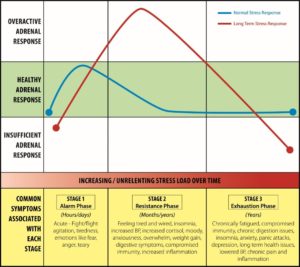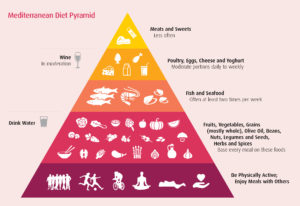Stress produces higher than normal cortisol levels in your body. It’s the body’s way of reacting to stress. However, when those high cortisol levels are constantly high, your body reacts in an unhealthy way.
Burnout from constant stress is a growing health concern and would have to be one of the main causes of fatigue I see in clients.
Did you know that nearly 90% of visits to a doctor are from stress related health conditions?
That’s staggering – it’s an epidemic!
Small amounts of stress are good for you. It can motivate you and sharpen your focus, give you a little excitement and be stimulating to create a burst of energy.
The greater the intensity of the situation : the greater your stress response
But, our modern day lifestyles now put us in constant stressful situations such as work deadlines, being stuck in traffic, endless emails, constant social media, money stress, environmental toxic stress, negative news stories everywhere you look.
Enter Cortisol
In response to a stressful situation, your body releases a hormone called cortisol. This is a chemical that allows you to stay in an active, attentive state for long periods of time in order to survive the stress. However, with our chronic stressful lifestyles, cortisol cannot return to normal healthy levels, and it begins to affect every system in your body.
High cortisol levels from stress can cause:
- anxiety, depression and other mood issues
- fatigue and low cellular energy production
- brain fog, reduced cognitive function and poor memory
- weight gain and altered metabolism
- inflammation and pain around the body
- insomnia and non restorative sleep
- lowered sex drive and altered reproductive hormones
- high blood pressure
- blood sugar imbalances and insulin resistance
- weakened immunity
- cell damage
- digestive dysfunction including altered bowel habits and food intolerances
- thyroid imbalance and dysfunction
A long list indeed! And, here’s another staggering stress statistic:
Australia now holds the unenviable title of being the 2nd highest prescriber of anti-depressants in the world!
Eating to Manage Stress and Cortisol
You are what you eat
What you consume fuels your body and makes you what and who you are. Eating well ensures you have a healthy brain and nervous system, adequate brain chemicals for mood stability and everything else that your body does to keep you alive.
The Mediterranean Diet is the best way to eat for better health.
There are certain foods that are of particular benefit for healthy moods, a healthy brain and a healthy nervous system. Eat more:
- Protein – essential to balance blood sugar, make brain chemicals (for mood) concentration and sleep. Plant or animal protein – it doesn’t matter – but eat more of it!
- Essential Fatty Acids – necessary for healthy cells, brain and nervous system. Eat more oily fish, nuts, seeds and avocado.
- Magnesium – required to help muscles relax, for a calm mind and a relaxed body (see food sources of magnesium in handout below).
- B Vitamins – needed for energy production, a healthy nervous system response and good brain function (see food sources of B Vitamins in the handout below).
Building resilience for a better stress response
There’s a word called “allostasis” which refers to the state when your body returns to normal after an event. You can help this along by building resilience. Building good resilience gives you a tool to have more stability during stress and subsequent cortisol spikes.
You can build better resilience by:
- getting good quality restorative sleep – go to bed at the same time every night and get up at the same time every morning. This helps to reset your body clock. Make sure your bedroom is quiet, comfortable and cool. Reduce light and noise and create a bedtime routine that cues your body that it’s time to slow down and get ready for sleep. If you need more help with this, contact me.
- moving your body – aim for around 30 minutes of moderate activity a day. It doesn’t need to be the gym, walking is good for burning off adrenaline
- having fun and relaxing – 10-15 minutes is a good start – laugh, watch a comedy, tell a funny story or do something relaxing
- spending time in nature – water your plants, sit in the garden, walk barefoot on the grass for 5 minutes at lunch time. Choosing a nature activity (big or small) to do every day if possible or once a week which will help you to feel calm
- watching your breathing – you are an expert at breathing, you know. You’ve done it since birth. But how often do you stop and notice how you are breathing? Do you take deep or short shallow breaths, do you hold your breath when stressed? Pay attention and notice how your breathing changes in different situations. It’s possible to calm your nervous system by taking deep, slow breaths in through your nose, and then exhaling slowly out through your mouth
- practicing gratitude – this has many health benefits like improving self esteem and mental wellbeing, reducing anxiousness and bad moods and giving us a deeper perspective. Notice the little things and be thankful
- being creative – you’re never to old to take up a hobbie and tap into your creativity. It’s an area that’s often neglected once past childhood and it’s something that can bring so much joy and fulfilment. Give it a go.
Your next steps
If you have been experiencing ongoing stress and suspect your cortisol levels are impacting your health and quality of life, then it’s time to take action I can help you with a treatment plan specific to your needs so that you’re full of energy, calm and back to your best self.
Here’s how:
- Book in for a consultation (in Clinic, Zoom or over the phone) to really drill down on what’s draining you and how to get going again – Click here
- Lose weight and reboot your metabolism. A true energy booster – Click here
- Not sure what you need? Book in for a 20 minute FREE discovery call chat with me – Click here
- Sign up for my Newsletter for more tips – Click here
With your health in mind,
Catherine x




One comment
Hi Catherine,
Thank you for sharing! I find the information and recommendations very useful, especially the list of food sources of nutrients. I have printed it out, and I use a laminated version in the kitchen.
At the same time, I feel reassured that our family is doing very well in terms of having a healthy and varied diet. After all.. there may be not enough toilet paper around, there is plenty and plenty of beautiful fresh food in the (super)markets.
Please stay well and healthy and looking forward to catch up with you on the 8th of May (I have just booked an appointment).
Warm regards,
Lilian